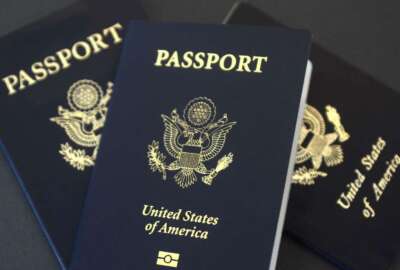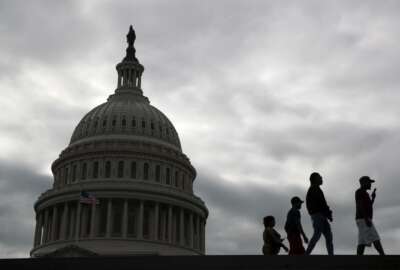
USPS lays out suggestions on vote-by-mail services for local governments
In today's Federal Newscast, with vote-by-mail services in high demand, the Postal Service sets recommendations for state and local governments to make sure each...
To listen to the Federal Newscast on your phone or mobile device, subscribe in PodcastOne or Apple Podcasts. The best listening experience on desktop can be found using Chrome, Firefox or Safari.
- With vote-by-mail services in high demand, the Postal Service set recommendations for state and local governments to make sure each ballot gets counted. USPS recommends election officials allow a week for the agency to send ballots to voters, and have voters mail back ballots at least a week out from Election Day. The agency encourages officials to send materials via first-class mail, and use Intelligent Mail barcodes to track delivery and return of ballots.
- The State Department rolled out a three-phase plan of how it’ll reopen passport service offices. The agency in March suspended expedited passport processing, and limited service to life or death emergencies. The first phase of reopened sites will require limited staff to return to work, wearing masks and practicing social distancing. Employees will process applications on a first-in, first-out basis. The National Federation of Federal Employees says passport specialists have been out of weather and safety leave during the pandemic, and haven’t been allowed to telework. (Federal News Network)
- Employees at the Social Security Administration answered fewer calls from the public in 2019. Callers waited longer on the phone for service. More encountered busy signals or had their calls dropped altogether. But the SSA inspector general says 80% of callers had their issues resolved in the first call. The IG says lower staffing levels and an increased number of calls related to imposter scams contributed to the lower service levels. SSA teleservice staffing dropped 12% in 2019. SSA tells the IG, it hired 460 new employees to help fill staffing gaps in the first quarter of this year.
- Top health professionals at the Department of Veterans Affairs are one step closer to getting their correct salaries. A bill designed to end an old pay cap for certain health professionals at the Department of Veterans Affairs will head to the president’s desk for his signature. The Competitive Pay for Leaders in Veterans Health Care Act easily passes the House. The bill corrects an unintended consequence from a 2010 bill that was supposed to help VA fill Senior Executive Service positions. It specifically will exclude Title 38 SES members from an existing salary cap. The legislation already cleared the Senate earlier this year. (House Veterans Affairs Committee)
- NIH is seeking what it calls digital health solutions to COVID-19. The National Institute of Biomedical Imaging and Bioengineering, and the National Cancer Institute want ideas from industry. They’re looking for how to use multiple data sources, privacy preserving technologies and computational tools. Researchers say they want to better manage population health and individuals’ lives by contact tracing, monitoring, and linking people to clinical trials, superseding what NIH calls the blunt tools of social distancing and quarantine.
- The Defense Department’s artificial intelligence hub is using data to help with the coronavirus response. The Joint Artificial Intelligence Center is using 75 sources of public data to assess risks to important supply chains. JAIC has more than 40 models it provides to U.S. Northern Command and the National Guard. JAIC Director Lieutenant General Jack Shanahan says none of the models are perfect, but they are improving and helping leaders make decisions on positioning resources. (Federal News Network)
- DoD has announced two Defense Production Act projects worth more than $18 million to help the space industrial base during the coronavirus pandemic. One $12.5 million project will be performed over three years and support semiconductor product and process integration with satellites. The other program will expand the production capability and capacity for advanced satellite solar cells and solar panels.
- More details on the DoD’s new cybersecurity standard for industry are coming as early as this week. Potential certifiers and assessors of the Cybersecurity Maturity Model Certification or CMMC will get a better idea of their training requirements this week. The CMMC Accreditation Body expects to release these details as soon as today. While the requirements are not yet final, the AB outlined some of its thinking around the requirements in a recent webinar. For instance, a certified assessor of a company will need between 40 and 60 hours of training. The body is expected to begin the initial education workshops later this month. (Federal News Network)
- The Navy has a Senate-confirmed secretary for the first time in seven months. Retired Rear Adm. Kenneth Braithwaite was sworn in during a private ceremony on Friday. He replaces Richard Spencer, who was fired last fall. In his Senate confirmation hearing, Briathwaite said he sees his job as guiding the Navy though what he called “rough waters” and “leadership failures” in recent years. Those include the Fat Leonard scandal and the recent controversy on the U.S.S. Theodore Roosevelt that also prompted the resignation of Navy undersecretary Tom Modly.
- The top Democrats on the House Foreign Affairs, House Oversight and Reform, and Senate Foreign Affairs Committees expanded their probe into what led President Donald Trump to the fire the State Department’s inspector general. Rep. Eliot Engel (D-N.Y.), Rep. Carolyn Maloney (D-N.Y.) and Sen. Bob Menendez (D-N.J.) plan to interview senior agency officials about the events that led up to the firing. That includes a review of the IG office’s ongoing work, and whether those reviews led Secretary of State Mike Pompeo to recommend that Trump fire the IG.
- Probationary employees who file whistleblower and retaliation complaints are let go at higher rates than permanent employees who did the same. The Government Accountability Office says the lowest estimated termination rate for probationary employees who blew the whistle was 10%. Agencies terminated 5% of permanent employees who filed similar complaints. But GAO says it doesn’t have enough data to determine whether probationary whistleblowers are consistently let go at higher rates than permanent employees. GAO says the Office of Special Counsel should require anyone who files a whistleblower complaint to specify whether they’re a permanent or probationary employee.
- Diana Gowen, the long-time federal telecommunications expert, passed away after a long battle with cancer. Gowen was the senior vice president and general manager of MetTel’s federal practice for the past four-and-a-half years. She also held leadership positions with major telecommunications companies including CenturyLink Federal, Qwest Government Services, MCI Government Services and AT&T Commercial Markets. (Federal News Network)
Copyright © 2024 Federal News Network. All rights reserved. This website is not intended for users located within the European Economic Area.
Eric White
Eric White is news anchor and Federal Drive producer at Federal News Network.
Follow @FEDERALNEWSCAST
Related Stories
Getty Images/iStockphoto/Kalawin

CMMC accreditation body close to releasing assessor training requirements
Related Topics
2020 election
All News
Bob Menendez
Carolyn Maloney
Cybersecurity Maturity Model Certification
Defense Production Act
Diana Gowen
Eliot Engel
Federal Drive
Federal Newscast
Government Accountability Office
House Foreign Affairs Committee
House Oversight and Reform Committee
Joint Artificial Intelligence Center
Kenneth Braithwaite
National & World Headlines
National Cancer Institute
National Institute of Biomedical Imaging and Bioengineering
National Institutes of Health
Postal Service
Senate Foreign Affairs Committees
Social Security Administration
State Department
Tom Temin
whistleblower




